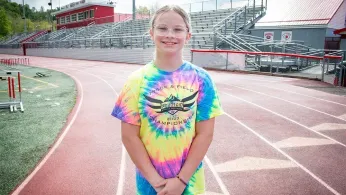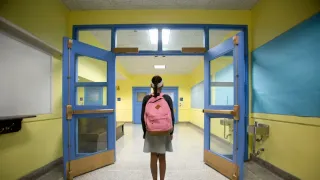
3 hours ago
Supreme Court to Hear Landmark Case of Transgender Athlete Becky Pepper-Jackson Challenging West Virginia Sports Ban
READ TIME: 3 MIN.
In 2021, West Virginia enacted House Bill 3293, a law that categorically bars transgender girls and women from participating in girls’ and women’s school sports. This legislation was signed by Governor Jim Justice, despite the absence of reported cases of transgender athletes competing in the state at the time the law was passed . The law is part of a broader national trend: over 75 anti-transgender bills were introduced in the United States that year, aiming to restrict the rights of transgender youth in various aspects of public life .
Becky Pepper-Jackson, now 15, has been at the center of the legal challenge against this law. Supported by her mother, Heather Jackson, Becky has fought for her right to participate in her school’s cross-country and track and field teams—sports she has played alongside other girls for the past three years under a court injunction . Becky, who began receiving gender-affirming medical care at the onset of puberty, argues that the ban not only denies her equal access to educational opportunities but also undermines her right to live authentically .
“I play for my school for the same reason other kids on my track team do—to make friends, have fun, and challenge myself through practice and teamwork,” Becky said. “All I’ve ever wanted was the same opportunities as my peers. Instead, I’ve had my rights and my life debated by politicians who’ve never even met me but want to stop me from playing sports with my friends” .
Becky and her legal team—consisting of the American Civil Liberties Union, Lambda Legal, and Cooley LLP—contend that West Virginia’s law violates the Equal Protection Clause of the Fourteenth Amendment and Title IX, the federal law prohibiting sex discrimination in education . Federal courts have previously issued injunctions allowing Becky to participate in girls’ sports, and in April 2024, the U.S. Court of Appeals for the Fourth Circuit ruled that the law violated Title IX .
The Supreme Court’s decision to hear the case comes as similar legal battles unfold nationwide, including Little v. Hecox—a challenge to Idaho’s ban on transgender athletes and sex-testing requirements . The outcomes of these cases will likely influence the legal landscape for transgender youth throughout the United States.
Major women’s sports organizations, athletes, and LGBTQ+ advocacy groups have spoken out against bans targeting transgender student-athletes. Notable figures such as Billie Jean King, Megan Rapinoe, and Sue Bird, as well as organizations like the Women’s Sports Foundation and the National Women’s Law Center, argue that such laws foster discrimination and exclusion, rather than addressing alleged concerns about fairness in competition .
Supporters emphasize that participation in school sports offers critical educational and developmental benefits to all students, including those who are transgender. “This case is fundamentally about the ability of transgender youth like Becky to participate in our schools and communities,” said Joshua Block, Senior Counsel for the ACLU’s LGBTQ & HIV Project. “Forcing Becky to either give up sports or play on the boys’ team—in contradiction of who she is at school, at home, and across her life—is really no choice at all” .
As the Supreme Court prepares to hear West Virginia v. B.P.J., the case is expected to have far-reaching effects on the rights of transgender students and the interpretation of anti-discrimination laws in education. Advocates underscore that the outcome will impact not only Becky but also countless other transgender youth seeking inclusion and acceptance in schools across the country.






